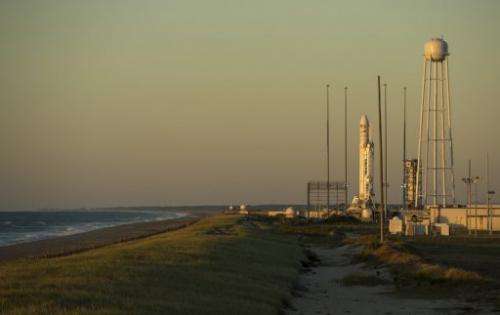NASA, Orbital Sciences poised for Wednesday mission to ISS

Orbital Sciences Corp. on Wednesday launches the test flight of an unmanned rocket to the International Space Station, as NASA forges ahead with its plan to privatize US space missions.
The Cygnus capsule, hitched to Orbital Science's Antares rocket, is set to blast off at 10:50 am (1450 GMT) from NASA's Wallops Flight Facility, for a Sunday rendezvous with the ISS.
Orbital Sciences is one of just two private US companies enlisted by NASA to carry payloads to the orbiting space station. The other is California-based Space Exploration Technologies, or SpaceX.
Wednesday's demonstration flight—the first to the ISS by the Virginia-based Orbital Sciences—is meant to show that Cygnus can successfully deliver cargo to the space station.
If the test is successful, it could lead to regularly scheduled missions within months.
NASA is eager to give private industry the job of carrying cargo and crews, in hopes of cutting costs, now that its space shuttle fleet has been retired.
"This is so critical for NASA to continue to resupply the ISS," said Alan Lindenmoyer, director of the US space agency's commercial crew and cargo program.
Lindenmoyer said that outsourcing the flights "allows NASA to focus on the more challenging efforts of continuing human exploration deeper into space."
The US space agency plans to focus its attention on deep-space missions to land probes on asteroids and Mars.
Orbital first launched its Antares rocket, carrying a dummy payload, on a successful trial flight in April.
During this week's mission, Cygnus will ferry about 1,600 pounds (some 700 kilograms) of food, clothing and cargo for the crew aboard the space station. It will remain docked to the ISS for a month.
Orbital Sciences has a $1.9-billion contract with NASA that requires the company to deliver freight to the ISS over the course of eight flights by the beginning of 2016.
SpaceX made history in May 2012, when its reusable Dragon capsule became the first commercial spacecraft in history to successfully attach to the International Space Station in a test flight.
The Dragon capsule so far has made three trips to the ISS.
Unlike the Dragon capsule, Cygnus cannot return to Earth and will be destroyed upon re-entry after its mission is complete.
Cygnus's launched, as well as Sunday's rendezvous will be webcast on NASA TV.
Forecasts late Tuesday showed a 75 percent likelihood of favorable weather conditions for the launch, according to NASA test director Sarah Daugherty, who said that conditions look good "from a launch weather perspective."
© 2013 AFP




















